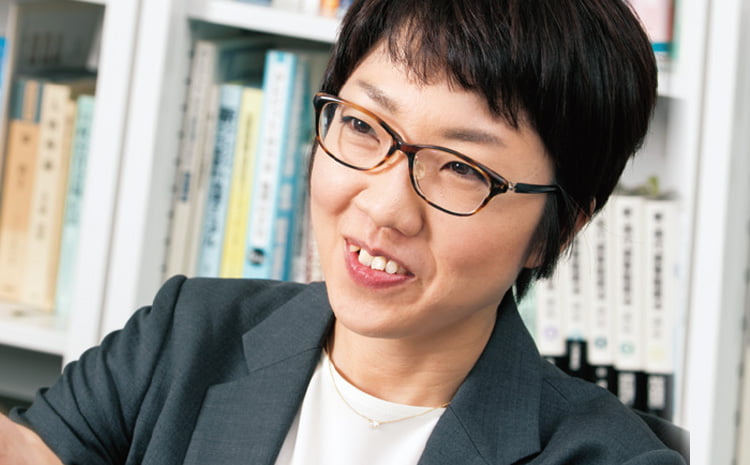
Protecting social justice
(graduated in 2007/Graduate School of Law)
What I learned was
not standardized formulas
but the ability to think for yourself flexibly.
This directly benefits my practice as a lawyer.
Yuko Ikemoto became a lawyer after graduating from the Graduate School of Law, Soka University, as a member of its inaugural class. She is still proud of that time, and she now undertakes a wide variety of dispute resolutions every day.
Wanted to acquire abilities and use them for society.
Before I aimed to become a lawyer, two events motivated me to acquire my abilities and use them for society.
I was initially aiming to become a bureaucrat and took the national civil service examination. I passed the written test but completely failed in promoting myself during my PR visit to government offices in Kasumigaseki. I acutely felt from this experience that I wanted to acquire some actual abilities.
The other episode was when my old friend from my primary school years consulted me after she had suffered a case of fraud by a correspondence course company. She had a right to claim her money back, but in reality, I didn't know how to get the stolen money back. I felt that there is an enormous gap between what I had studied and whether I could apply it in reality. Despite that I had studied hard, I could not help a person right in front of me. I thought actual abilities would close this gap, and in my case, such ability would be the qualifications of a lawyer.
To add a new page to be remembered in the history of the university
I was a member of the inaugural class at the Graduate School of Law, Soka University (hereinafter, “the Graduate School of Law”). It was a three-year course. We had another option of a two-year course, so the students that chose that option took the bar exam one year ahead of my class. When I saw them passing the exam, I promised to myself that I would also add a new page to the history to Soka University.
As a unique feature of our Graduate School of Law, we were given a great deal of autonomy, partially because we were in the inaugural class. For example, students freely made dormitory rules. It was, in a way, tough because we had to decide everything ourselves. Still, it was a great experience. Teachers and staff had strong faith in looking after every student. After graduation, I became a tutor at the Graduate School of Law. Until I spent my time there as a tutor, I had never realized that teachers make such hidden effort to support students by sharing the detailed status of each student and to address issues.
What pops into my mind first about my three years at the Graduate School of Law is that I devoted myself to training for thinking for myself. For example, in a civil law class for the Japanese "Presupposed Ultimate Fact Theory," one professor used an expression and metaphor relating to “presupposed ultimate facts that are jelly-like.” What he meant was that, laws and the articles therein do not change form themselves, but their interpretations do change over time, thus they are jelly-like, and that this can lead to paths for dispute settlement. This kind of things reminds me that my learning from my university years is alive in my professional work.
My current work is dealing with general civil matters. I basically handle a wide range of issues, from traffic accidents, debt restructuring, divorce, inheritance, and contract disputes between small and middle-sized businesses. While managing these matters, I envision my goal. I want to accept any problems faced by ordinary people in an ordinary society, whatever it is, and then have the ability to solve them.
※ Interview article from SUN issue No. 100


Completed the curriculum of the Graduate School of Law, Soka University in 2007; passed the bar exam
Registered as a lawyer with the Tokyo Bar Association in 2008
Entered Century Law Office (Tokyo) in 2008
Via an office merger, presently with the SATO new comprehensive law office
Lawyer in charge of consultations/mediation,
headquarters of the Japan Federation of Bar Associations Traffic Accident Consultation Center
Member of the Japanese Association of Sociology of Law

